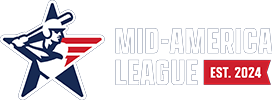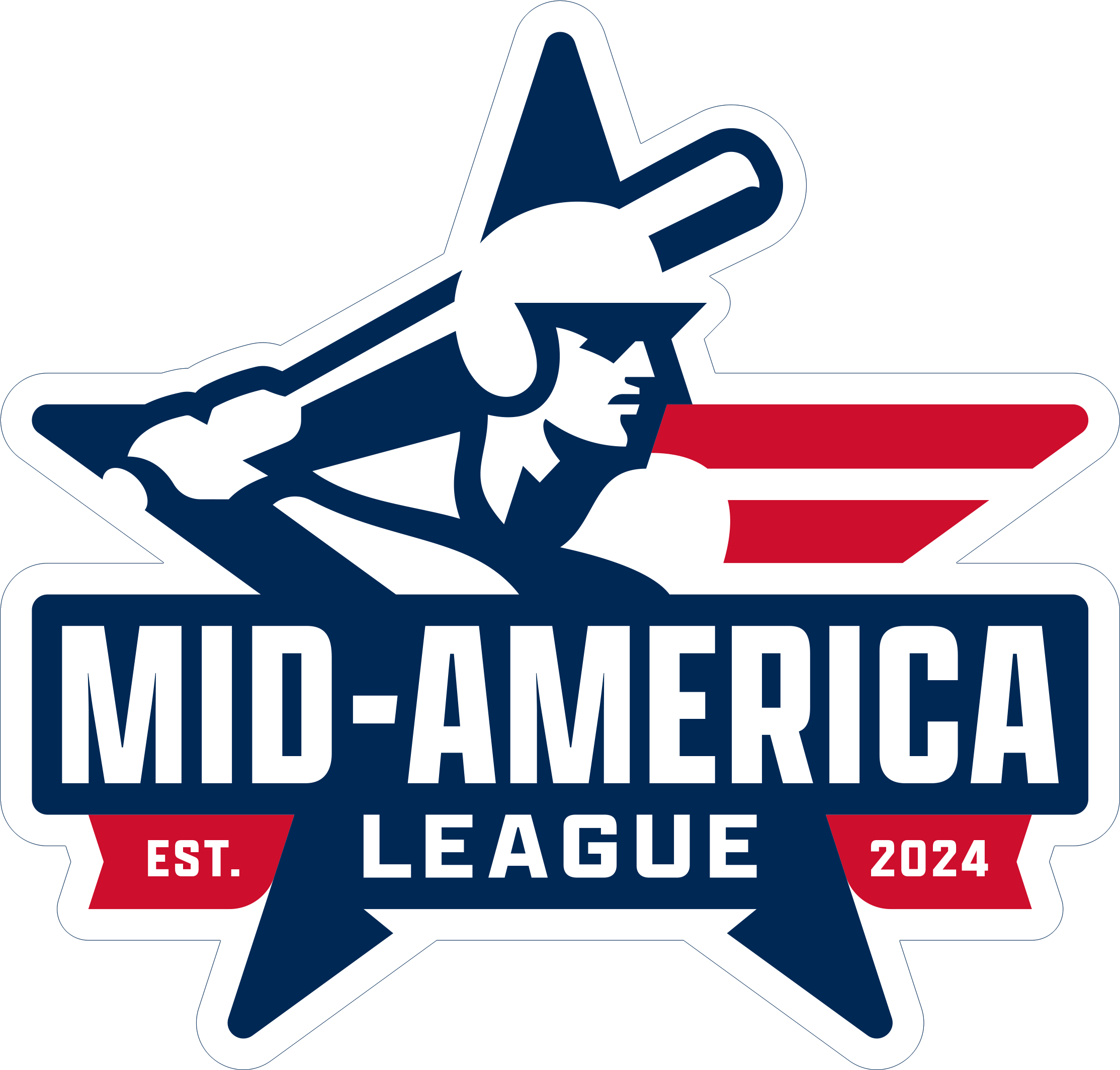Fort Smith’s Big Indie Baseball Dream
by Jacob Kauffman December 27, 2024
“Jacob, if you could sell 500 tickets to a Tuesday game if you played second base, you’d be playing second base,” offered Mid-America League Former President Matt Perry, full-heartedly and half-seriously considering my question about exactly who it is that makes up the rosters in his dynamic, brand new, minor league-adjacent baseball operation with teams in places like Fort Smith and Texarkana. Putting the daydreams of this 36-year-old hack aside, keeping dreams alive is what baseball on the margins is all about. For this nascent league, deep in winter preparation, a potentially make-or-break second season looms on the horizon for summer 2025.
“We’re looking for needles in haystacks, players who might have been missed by the MLB Draft, free agency, or maybe have been released by a pro organization, and we’re giving them their way back,” said Perry. “But most of our players are in collegiate programs and looking to develop in a highly competitive amateur status summer league, and we also have some really talented high school players who just graduated on our rosters.”
All six of the franchises that make-up the Mid-America League have announced they are returning after their inaugural year, a feat which isn’t always readily guaranteed in the frontier world of low-level organized baseball. Teams are located in Fort Smith (AR), Texarkana (TX), Abilene (TX), White Oak (TX), Sherman (TX), and Joplin (MO). The league’s optimistic it can expand to 16 teams a few years down the road, with potentially another team in Arkansas. League and clubhouse management are taking full advantage of their first full-length off-season. Quality of play – and the quality of the fan experience – top the priority list.
For cities like Fort Smith, they’re hoping the upstart league and the growing footprint of the Fort Smith Marshals baseball franchise can help give their city some new paths forward too. Mayor George McGill is one of the most vocal boosters of the whole endeavor. He envisions the construction of a riverfront stadium nestled along the banks of the Arkansas River.
“The riverfront in Fort Smith is a beautiful location for a ballpark. It currently has the newly-constructed U.S. Marshals Museum, Fort Smith Park, an amphitheater, and the School of Arts – all of that is in that same beautiful stretch along the river. This would be a home for the Marshals but it would also benefit and be used by the whole community for a variety of events,” said Mayor McGill.
In August 2023, city officials took initial steps by authorizing $75,000 to be spent to have Mammoth Sports Construction “provide design services for a potential baseball stadium and related services.” Preliminary estimates for an “entry-level” multi-purpose stadium, seating approximately 1,500 fans, predict a cost of “roughly $10 million,” according to city records. Local businessman Bennie Westphal also agreed to pay $75,000 for the study. Westphal has been working for more than 20 years to bring a team to Fort Smith. He is part of the local ownership group and owns the land where the stadium would be located. The study remains in development as the Marshals head into their second season at the University of Arkansas Fort Smith’s Crowder Field.

The atmosphere at the Marshals games this past summer certainly had its high points. The home opener saw more than 700 fans turn out to see the first organized baseball in Fort Smith in more than 70 years. Cold beer, BBQ nachos, jersey give-aways, True Grit-themed nights, on-field games in between innings, and a quality mascot had the ballpark humming on some nights. Fans might have caught a game featuring two league-leading, former San Diego Padres prospects from Cuba that played on a rival team.
The Marshals did their part on the field, playing exceedingly well in the first half of their 68-game season. Their roster also featured a former MLB draft pick, Ethan Clark, who spent time in the Tampa Bay Rays farm system. Another pitcher, Jonathan Martinez, went on to be signed by the pro-level independent minor league the American Association. Plenty of hometown players made their mark on the roster, too. The team even garnered some limited coverage from local newspaper and television reporters.
But on a few of the slower, hotter, late-in-the-summer nights, in-the-stands attendance could dip perilously to the verge of a sub-100s range and the energy could be noticeably absent. The team’s performance slipped as well, losing 20 out of their last 24 games. Arkansan Mason Wiggins, the older brother to two pitching standouts, one a recent Chicago Cubs draft pick and the other a University of Arkansas commit, saw his hopes to rehabilitate a career that was once sidetracked by injury and an enlistment in the Navy, fall short. Still, even then, you were likely to catch a little league team lined up against the Marshals dugout excitedly hoping to snag an autograph, a care-free couple on a first date, or a local state Representative like Jay Richardson catching a few innings of summer baseball in Arkansas’s (for now) third largest city. You’re certainly likely to catch a Mid-America League branded foul ball if you’re looking to channel those dormant baseball skills.
It’s a decidedly far cry from the game-day feel and the caliber of play put forward on the field by Arkansas’s professional minor league baseball teams, the Northwest Arkansas Naturals (affiliated with the Kansas City Royals) and the beloved Arkansas Travelers (affiliated with the Seattle Mariners). But that may be missing the point. Marshals General Manager Greg Kigar, who has front office experience in the (formerly) Oakland Athletics minor league organization, relocated with his family from Michigan before the start of last season.
“We’ll get closer to that point and we definitely want that minor league feel,” said Kigar. “You can’t expect to just get there in one year, but I think people will see what we tried to accomplish, and if they came and enjoyed a game, they should know we’re going to take a big, big leap forward in year two and we’re off and running making plans for it.”

That includes looking at the marketing wins of Mid-America League teams like the far-away Abilene Flying Bison, who routinely managed to draw 600-1,000 fans. That’s a sustainable level of support that Kigar and GMs throughout the league say they are reaching for and believe to be possible. The Flying Bison had an organist, live game-day radio broadcasts, and local television news were even occasionally on the scene with live updates from important games. Abilene had a minor league team as recently as the 1990s. Fort Smith’s closest rival, the Joplin Outlaws, play in a recently updated former minor league stadium that long-ago saw greats like Mickey Mantle and Ty Cobb on the diamond.
In Fort Smith, Kigar has been busy talking with local organizations, securing sponsorships, scouting players, and doing the patient work needed to build community support and to turn long-term plans, like a new stadium, into reality.
“There are definitive plans out there, but at the end of the day, we’ve got to get it paid for. My background is more than baseball; it’s special events, festivals, and all that tied-in, and that’s what a stadium can bring. I don’t want people to get the idea that ‘we get three months of baseball and then what else are you gonna do?’ This facility would be a huge asset for all of Fort Smith and the River Valley.”
Kigar said he’s seeing the results of hard work pay off as the off-season progresses. That may include reaping the rewards of treating his players well. Pitcher Ethan Rivera played for the Marshals before signing onto a spot with the hard-scrabble, independent pro-level minor league, the Pecos League. For Rivera, Fort Smith established a good reputation as a place that takes care of its players.
“I got to the league late and was put into a hotel and it was a great situation. Most players stayed with host families and they enjoyed that, too. We had coupons for breakfast, a gym membership, we were treated right, and we weren’t just left on our own. The Marshals were a perfect place for me,” said Rivera.
“It took about a month and a half after I got into the Mid-America League and logged some innings and threw up some stats and found some success, thank God. After a complete game against Joplin, I got “Pitcher of the Week.” Because of that, a buddy hit me up who played in the Pecos League, where I ended up going, and said, ‘Hey, we could use some pitching. I’m going to send our skip some info and talk to him and see what happens.’ Then it all happened quick. I flew into Bakersfield and planned on having my start with the Train Robbers that next day, but all my luggage was still stuck in Dallas. So I had to buy new pants, new socks, a new belt…I had my glove with me…but it was frantic. I was breaking in new cleats on my first trip to the mound.”

Taking steps across clay and dirt, through the grass, with a hot summer breeze and the idle chatter of a hometown crowd cutting through the night air, while dreaming big on a long-shot borderlands future, rooted somewhere on the fringes of the afterglow of America’s pastime is the kind of quintessential tall-tale story in the making that the mayor of Fort Smith seems to live and breath.
“I had a chance to throw out one of the opening pitch game balls this year in my Marshals gear. I felt like I was Satchel Paige,” said Mayor McGill. “My father played on an old Negro League’s semi-pro regional team called the Muskogee Hustlers. My dad was one of the star pitchers on that team, and that’s where it all started for me.”
He’s hoping that translates to a few thousand could-be devoted fans in the Arkansas River Valley.
“We encourage people almost daily to attend, to show our support,” he added. “That will help the sponsors and developers feel even more comfortable investing in a multi-purpose stadium. We’re excited about how things are going so far.”
For now, Fort Smith isn’t scared to announce it intends to be swinging for the fences. Carving out a successful hybrid-roster, amateur-status baseball franchise is an ambitious goal, but Fort Smith is fighting hard to position itself as a city with vitality, on the far southern edge of Northwest Arkansas’s Walmart-driven meteoric economic rise.
For the players across the Mid-America League who are taking the field in towns like Fort Smith, and for the die-hard fans trickling into the smallest of grandstands, it’s a dream one is almost instinctively compelled to follow.
“Going into Fort Smith, I was a little nervous,” said Ethan Rivera, headlights burning bright while driving his vehicle down a Texas highway. “I didn’t know what to expect and actually, in my debut, I sucked. I went out there for a relief inning and walked three straight guys and got pulled. But that team is exactly what I needed, the support, the constant development…those guys on that team, they’re a bunch of grinders, man I love that team. They’re just a bunch of guys who love the game of baseball and have that hope just like I do to get called up to a higher league and to keep living that dream.”
“It was all worth it. If you have that dream, go for it, it’s so worth it.”
—
Jacob Kauffman is a freelance reporter who has worked with National Public Radio, PBS NewsHour, and small-town newspapers like the Nashville (Arkansas) News. He’s a lifelong baseball fan, one-time assistant coach at the historic Little Rock Central High School, veteran utility player for the sandlot team the Little Rock Growlers, and a proud rookie member of the Society for American Baseball Research.



